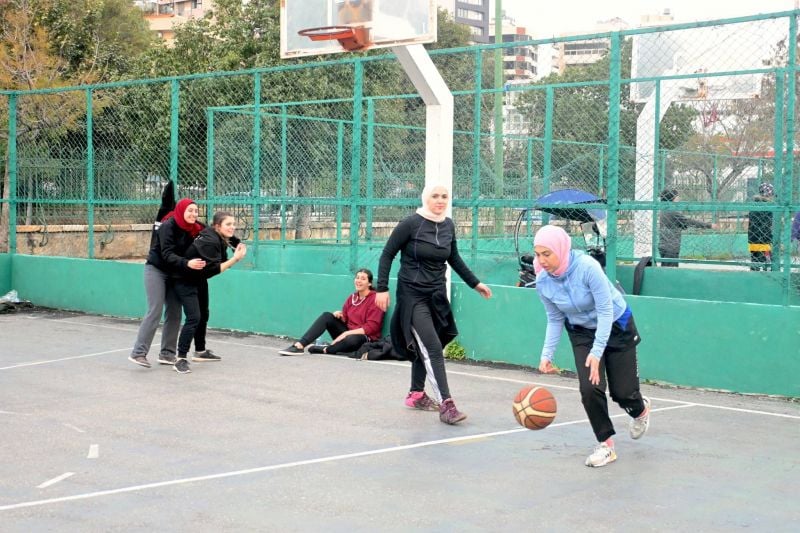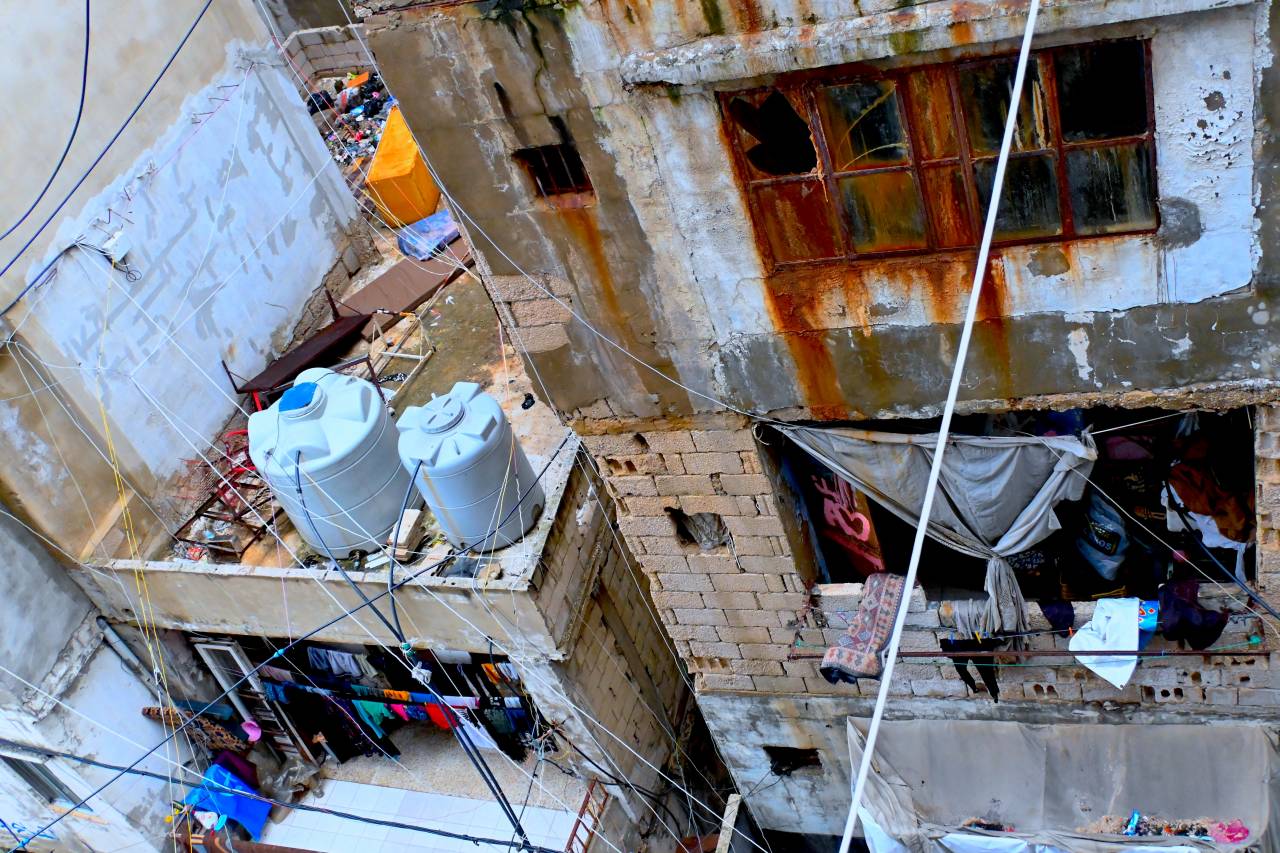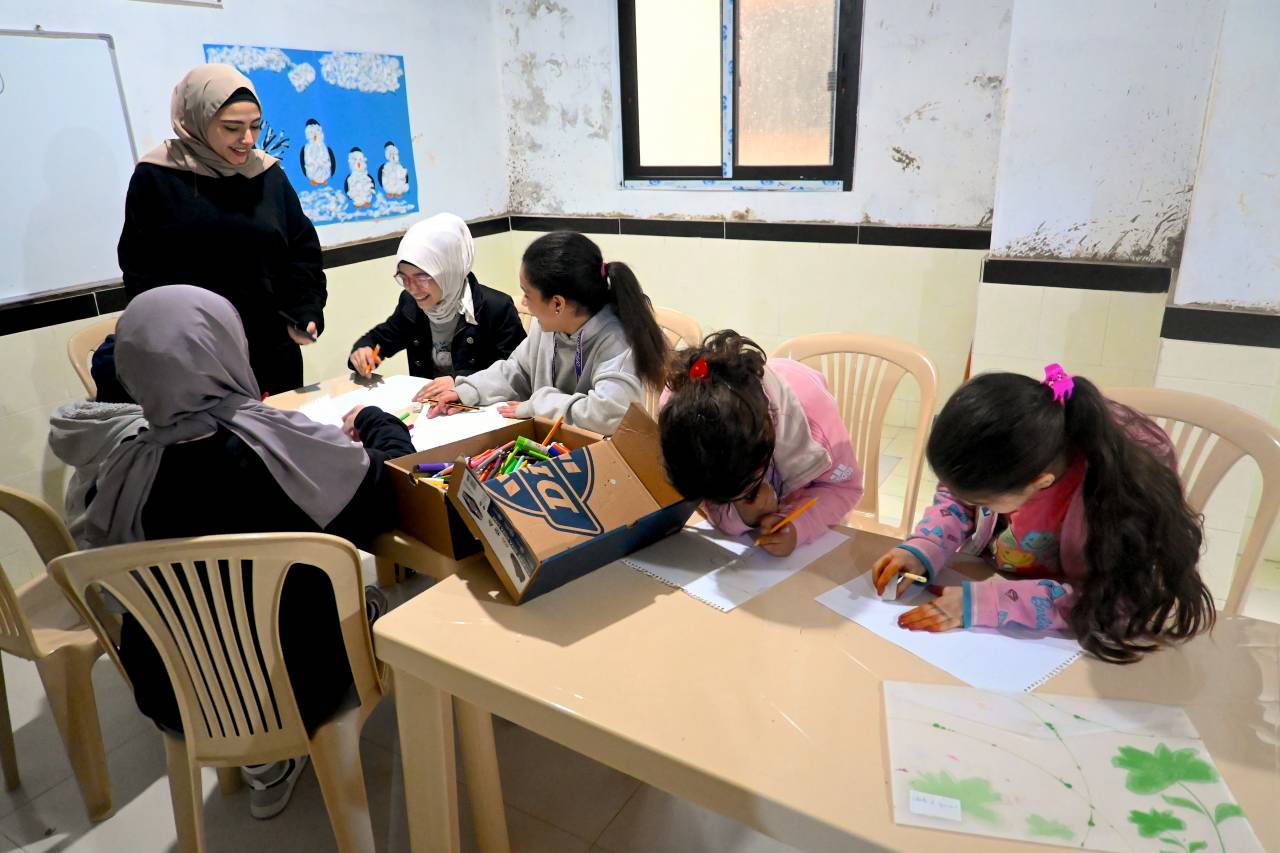
Marwa Hamdan (right) chases the ball during a practice of the Palestine Youth Basketball Club. Rola el Ferekh pictured at left, wearing a red hijab. (Credit: Farah-Silvana Kanaan/L'Orient Today)
BEIRUT — Unfazed by the gusty winds, threatening skies and occasional drizzle, a group of girls giggle with giddy exuberance while playing a game of hoops in Qasqas, near Horsh Beirut. Determined to win, the respective teams shout out the score after every hard-won point, while their coach alternatively encourages and playfully scolds them.
The Palestine Youth Basketball Club, the Shatila refugee camp’s all-girl basketball team, has a mission that reaches far beyond sports alone. Not only does the team offer a safe space for young Palestinian, Syrian and Lebanese women in their teens and early twenties to play sports and express themselves, the players are increasingly setting up projects to support their wider community. While there are NGOs that organize all-girls sports activities, including basketball, in other Palestinian refugee camps, this team is the only one in Lebanon that was built by and is predominantly run by Palestinians. (However, girls from all nationalities are welcome to join.)
Rola el Ferekh, a 21-year-old Lebanese woman from Qasqas, stumbled upon the team at the local courts, where she would regularly play basketball for fun with her father, when she was still in high school. Not used to seeing girls play basketball together, she asked if she could join them and was immediately welcomed onto the team. She has now been the team’s captain for five years.
“At first I just joined because I wanted to play basketball, but now my teammates have become my family,” she says. “We do everything together.”
Marwa Hamdan, 22, a Palestinian from Shatila who studies English Literature at the Lebanese University, has been playing with the team since she was in the ninth grade. At the time, her UNRWA-run school organized a sports activity where she met PYB coach Majdi Majzoub, who told her she was welcome to join a practice session.
Hamdan’s mother didn’t like the idea of her joining the team at first, because she didn’t want her daughter to play outside in front of boys. She slowly came around after attending some practices and seeing how protective the coach was of the girls.
“Coach Majdi is not just our coach, he’s like a father to us,” Hamdan says. “He’s always there for us, even if it’s unrelated to basketball. Whether it’s medicine, money for school or anything else, he does everything he can to fulfill our needs.”
'Captain Majdi'
Majdi Majzoub, or “Captain Majdi” as he is affectionately referred to by the girls and the rest of Shatila, is the rare “patriarch” with a matriarchal mission: to empower girls in any way he can.
After creating the football academy “The Boys of Palestine'' when his son was six years old, to prevent him and other boys in the camp from going on the wrong path, Majzoub was inspired to start an only girls basketball team in 2012 by his then 12-year-old daughter.
“I wanted her to play sports in a safe environment and asked her, ‘Do you prefer to play football or basketball?’” Majzoub says, just as the electricity cuts in the Shatila Community Center, smiling at the memory. “As you can see, she chose basketball.”
While the team isn’t allowed to join any competition or play any official tournaments in Lebanon because Lebanese sports team can only include one Palestinian, Majzoub said, every few months or so, they get invited to play against amateur and even professional Lebanese teams. For instance, on Thursday evening they played a team in Chiyah and a few months ago the Armenian-Lebanese sports club Homenetmen invited them to play against their youth girls team.
For many of the girls, these friendly matches are an opportunity to escape the confines of the crowded camp, which was set up in the suburbs of Beirut in 1949 to host around 3,000 Palestinians who were forced to flee their homeland after a campaign of ethnic cleansing by Zionist militias. It was later the site of one of the most brutal massacres in Lebanon’s Civil War.
Including refugees who escaped Syria’s civil war, who now outnumber the Palestinian residents, around some 14,000 people are crammed together in an area that barely covers more than one square kilometer, according to a 2017 census, although many believe the actual number to be closer to 20,000. A stroll through Shatila’s winding narrow streets requires ducking exposed electrical wiring, which hangs between the makeshift buildings like a cynical version of fairy lights, and dodging deep puddles of muddy water and loose stones. It’s certainly not a place for kids to play freely.
 A view of the Shatila refugee camp in Beirut. (Credit: Farah-Silvana Kanaan/L'Orient Today)
A view of the Shatila refugee camp in Beirut. (Credit: Farah-Silvana Kanaan/L'Orient Today)
But what the camp lacks in basic necessities, it makes up for in a sense of community. Its residents are always ready to lend each other a hand.
Majzoub, whose family is originally from the village of Amqa, near Akka, in northern Palestine, was born in Shatila after his grandparents and parents were forced to flee during the Nakba.
A member of the Palestinian Football Federation in Lebanon and regarded by many in the camp as “the soul of Palestinian sport in Shatila and Lebanon,” the girls say, he teaches everything from football, basketball, volleyball, table tennis and chess to kids and youths in the camp.
Majzoub’s mission transcends sports, although he sees it as the perfect gateway to strengthen the community, he says: “Because the kids enjoy playing sports so much, I can encourage them to make better life decisions.”
His own childhood was marked by the memory of unimaginable horrors. Hidden away by his father, Majzoub survived the 1982 Sabra and Shatila massacre carried out by the Lebanese Phalangist militia, aided and abetted by Israeli forces, during the Lebanese civil war.
“So many people in Shatila only focus on the negative. And although I understand why, this gets us nowhere. If anything, we have shown that we can endure anything as a community,” Majzoub says. “And this is why I keep telling the girls: ‘Don’t let anyone stand in the way of pursuing your dreams.’”
The main goal Majzoub hopes to achieve with the Palestine Youth Club and the Shatila Community Center, which he also founded, is to show girls in the camp that they can be in charge of their own lives.
“We need to support girls, make sure they focus on their education, as this will be their most important weapon in the future,” Majzoub says. “If you nourish girls, you nourish families, and if you nourish families, you nourish society.”
Initially shy, Hamdan says that going to that first practice changed her life.
“I was a person who kept everything to herself, I wouldn’t talk about anything.” Playing basketball helped her relieve all the stress and depression, she says, turning it into positive energy. She started doing better at school and expressing herself creatively.
“I suddenly felt a sense of lightness I hadn’t felt before,” she says. “Not just physically, because I had more energy, but emotionally too.”
Basket beats borders
The girls who play for the Palestine Youth Club say they feel committed to applying the skills they have been taught, in life and on the basketball court, to give back to their community. Both Ferekh and Hamdan, among other girls on the team, volunteer at the Shatila Community Center, which has been offering free classes and activities since July of last year. Every day, kids between the ages of 8 and 16 come to the center to learn English, take drawing lessons, and play basketball, football and learn boxing. They also organize Christmas and Ramadan celebrations, with food, activities and gifts.
“Being on this team taught me from a young age that girls can do and be anything,” Hamdan says excitedly. She teaches English and does fun activities with the kids at the center. “But I don’t just teach a class. It’s just as important to talk to them about their feelings and to show them that they can be themselves with us.”
 In a classroom at the Shatila Community Center, where a number of the girls from the basketball team volunteer, girls create a Mother’s Day drawing. (Credit: Farah-Silvana Kanaan/L'Orient Today)
In a classroom at the Shatila Community Center, where a number of the girls from the basketball team volunteer, girls create a Mother’s Day drawing. (Credit: Farah-Silvana Kanaan/L'Orient Today)
While Majzoub is going through the process to get the center officially registered, he has found ways to collaborate on projects with different NGOs and friends he met along the way.
One such project is Basket Beats Borders, an nonprofit organization which was established after a chance encounter in 2017 between Majzoub and David Ruggini, who until recently was the head of an Italian NGO in Beirut. After the team came back from their first international tournament in Ireland, Majzoub said, they realized that this was the only way they could cross borders, not just athletically but also culturally and psychologically. Shortly thereafter, Basket Beats Borders was born.
Through Basket Beats Borders, the girls were able to compete in grassroots tournaments in Rome and Madrid over the years, which were self-organized in the host cities and independently funded. The organization also carries a distinct political message: its mission promotes ”everyone's freedom of movement and Palestinians' right to return to their homeland.” In 2015, when 16-year-old Palestinian activist Ahed Tamimi was thrown in jail by the Israeli authorities, they named their team after her.
“The more they try to cage us, “ says Hamdan, “the more we are determined to prove that Palestinian women can rule the world.”
The next tournament awaits the team in June in Madrid; however, their participation depends on whether they manage to get enough funding to cover their expenses.
Apart from carrying a message to the outside world, the girls aim to make change in their own community. After seeing the impacts of the economic crisis in Lebanon on girls and women, they started a collaboration with local Lebanese NGO Jeyetna to combat period poverty by raising awareness and covering the costs of 300 personal care packages for women in Shatila.
Aside from the care packages, the project aims to organize ten educational sessions, one every month, for 30 women in the camp. During the session, they can talk about the issues they face during their periods and learn yoga moves to relieve cramps and of alternatives to expensive sanitary pads, such as reusable cups and period pants.
“We do this to make sure they are independent and can resort to other options if they don’t have enough money to buy pads,” says Rola, who is involved in the project from the side of Basket Beats Borders. “Although most have never even heard of these other options, they like the idea of an alternative solution, and they are so happy to receive the care packages.”
The GoFundMe page that was created for this project hasn’t met its goal yet which means they aren’t allowed to withdraw the funds that have been raised. But until the goal is met, they are trying to fund the project themselves.
“It’s too important not to,” says Ferekh. “A period is already bad to deal with for any woman, anywhere in the world, under normal circumstances, but imagine what it's like for women in Shatila.”